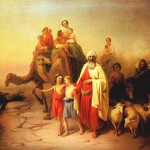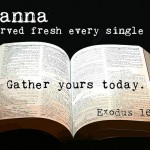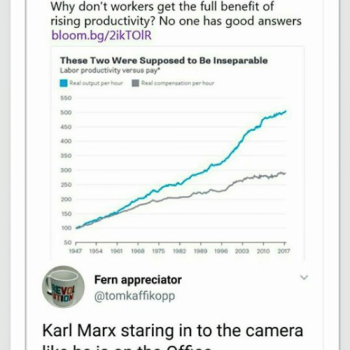The Kingdom was all about empowerment of the oppressed. When Jesus ate with sinners, tax collectors, and women, he was signalling both to them and to the world “we are all equals.” When he healed on the Sabbath or forgave sins, he was demonstrating to the people and the priests “You do not need an intermediary, or a fancy Temple, to have access to God” (Jesus’s healings, by the way, are best understood not as physical miracles of faith over body, but as prophetic statements that the “unclean” were still acceptable to God).
Jesus, unlike John, brought his movement on the road and deputized his disciples to do the same things he did. Thus, after his death, it was easy for them to continue. After all, could not the disciples heal just as Jesus had? Could not those whose lives he had touched continue to break bread together as equals? Were not Jesus’s admonishments against violence and injustice still pertinent?
Consider the most-likely historical charge that Jesus was “a glutton and a drunkard” (Matthew 10:19=Luke 7:34). It is explicitly contrasted with John’s celibate asceticism: “For John came neither eating nor drinking, and they say ‘He has a demon’; [Jesus] came eating and drinking, and they say, ‘Look, a glutton and a drunkard…'”
Is there more to this than the hypocrisy of Jesus’s critics? Was there some higher significance to Jesus’s meal practice?
Consider also Luke 10:7-8, Jesus’s instructions to the seventy disciples. He says to them, “Remain in the same house, eating and drinking whatever they provide…Whenever you enter a town and its people welcome you, eat what is set before you.”
This saying has a parallel in Thomas 14, where the meaning is more explicit: “If you fast, you will bring sin upon yourselves…when you go into any region and walk about in the countryside, when people take you in, eat what they serve you.”
Thomas combines this with the saying from Matthew 15:11 (“it is not what goes into a person’s mouth that defiles him…”) which is interesting because it means that saying 14 contains both a saying that appears only in Matthew, and one that appears only in Luke.
Be that as it may, it is clear that the Evangelists have re-contextualized all of these sayings. I mentioned before that Jesus’s practice of dining with the people he healed and preached to was meant to subvert patriarchal hierarchy, but based on this evidence I also see yet another layer of significance to it.
The idea of a fasting prophet would have been familiar to most Jews; the Essene community practiced an extreme form of asceticism, and numerous prophets of the Hebrew Bible, from Moses on Sinai to Elijah in the Nevi’im fasted, sometimes for as long as 40 days. No such paradigm of a “gluttonous” prophet, however, exists, and it is emblematic of Jesus’s subversive tendencies and the seeming shift in theology and eschatology he proposed.
Put simply, John fasted because the world was about to end. Jesus actively avoided fasting to portray the opposite message: the world is not ending; the Kingdom of God is here, now, and of this world.
Finally I want to highlight the difference between “eschatological” and “apocalyptic.” My view is that the Kingdom is eschatological, but not apocalyptic. Eschaton simply means “end” and in this context it can refer to the end of an era, or of an age, or a state of being. It is in this sense that the Kingdom is eschatological, for it refers to the end of the way of mankind and especially of Empire, and a beginning of the way of God; the way the world would be organized and people would live if God were sovereign. This comes not through divine intervention but active collaboration.
It is important that the Kingdom is non-apocalyptic not just because it saves Jesus the embarrassment of having been wrong, but because it empowers Christians the world over, even today, to be the Kingdom. Many of the destructive elements of Christianity today are the result of an unexamined eschatology that regards the end of the world as something that God is in ultimate control of. Why should we care about anthropogenic climate change, when God is eventually going to destroy the world anyways?
But that is not what the Kingdom is about. The Kingdom is a spiritual community that takes very seriously the question: what would it look like here if God was in control? And then poses to us a simple, but by no means easy, challenge:
Make it so.












